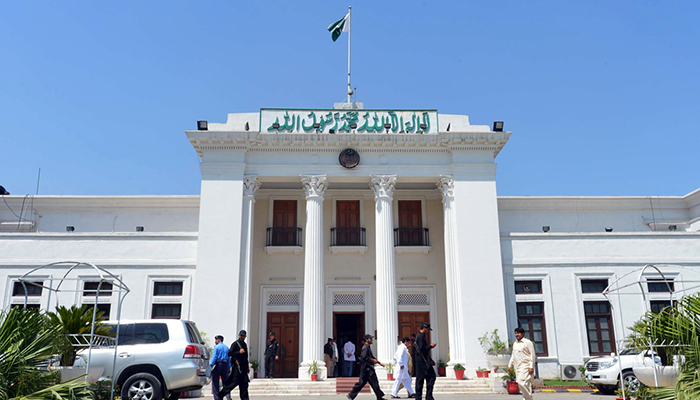Khyber Pakhtunkhwa has brought back PTI, but much has changed
Both Mehmood Khan and Shah Farman have generated controversy, which isn’t a good omen at the very beginning of PTI’s second stint in KP
August 24, 2018

Now that the Pakistan Tehreek-e-Insaaf (PTI) has started settling into its new role as the ruling party, it has selected a team to run the provincial government in its stronghold Khyber Pakhtunkhwa.
Mehmood Khan, a low-profile former provincial minister belonging to the conflict-hit Swat district, was a surprise pick by Imran Khan, the PTI chairman and now prime minister of Pakistan, as the new chief minister of KP. He wasn’t considered a frontrunner in the race for the job, especially in the presence of political heavyweights, such as the former chief minister Pervez Khattak and his cabinet minister for education, energy and power Mohammad Atif Khan. The latter was rumoured to be Imran Khan’s first choice.
Mehmood Khan’s name only surfaced after the PTI chairman had to look for a third, non-controversial candidate, as picking Khattak or Atif Khan could have led to grouping within the party.
The nominated chief minister faced no difficulty in winning the vote for the leader of the house due to the more than two-thirds majority of the PTI in the KP Assembly. He polled 77 votes against 33 obtained by Muttahida Majlis-e-Amal (MMA)’s Mian Nisar Gul, the joint candidate of the weak opposition comprising four parties.
Such is the overwhelming dominance of the PTI, aided by six independent MPAs, that any candidate fielded by the party would have won. The party also easily got its candidates, Mushtaq Ahmad Ghani and Mehmood Jan, elected as the speaker and deputy speaker of the provincial assembly.
Due to Imran Khan’s intervention, Atif Khan after being ignored for the chief minister’s job agreed to work under Mehmood Khan’s leadership by joining his cabinet to implement the PTI’s reforms agenda. Pervez Khattak had already accepted Imran Khan’s advice not to insist on staying in KP and instead shift to the centre. He has now been named the federal defence minister. While, Asad Qaiser, the former speaker of the KP assembly and also an aspirant for the chief minister’s office, was compensated as the speaker in the parliament. The shuffling around shows that the new prime minister has quickly learnt how to respond to his colleagues’ aspirations and demands and to do fence-mending before disputes trigger a crisis.
Even more surprising was Prime Minister Imran Khan’s choice of a party loyalist Shah Farman as the new governor of the province in place of the Pakistan Muslim League-Nawaz (PML-N)-affiliated Iqbal Zafar Jhagra, who like the other governors had to resign with the change of government. Farman, a combative PTI lawmaker who in the July 25 general election won one provincial assembly seat in rural Peshawar and narrowly lost another, hasn’t been known as someone with interest and knowledge about the erstwhile FATA, which before the merger came directly under the administrative control of the governor. Neither Mehmood Khan nor Shah Farman as provincial ministers in the previous PTI government showed extraordinary calibre or dynamism needed for bringing the ‘change’ promised by Imran Khan as he strives to build a ‘Naya Pakistan’.
Both the new appointments have generated controversy, which isn’t a good omen at the very beginning of PTI’s second stint in power in KP.
The KP of the past would look different this time, as the erstwhile Federally Administered Tribal Areas gradually becomes part of the province. Though the merger was officially notified in May, following the passage of the constitutional amendment bill in the parliament, the steps required to bring FATA into the mainstream through political, administrative, legal and economic reforms haven’t kept pace with the aspirations of the tribal people and demands of the pro-merger political parties.
Though Prime Minister Imran Khan in his more than an hour-long inaugural speech did mention his determination to quickly execute FATA’s merger with KP, and expedite work on development activities in the tribal districts, it remains to be seen how much attention his coalition government would be able to give to this issue in view of the plethora of challenges facing Pakistan. There is also the question of making available the resources needed to implement the reforms package, particularly the recommendation made by the Sartaj Aziz-led FATA Reforms Committee regarding the allocation of special funds amounting to around Rs100 billion annually for the next 10 years to bring under-developed Fata at par with rest of the country. This will be besides the Rs22 billion earmarked for the annual development program for the erstwhile Fata.
Furthermore, the security situation in KP would need greater attention as the province would henceforth share border everywhere with Afghanistan because the lawless FATA, with its special customs and traditions, no longer exists as a buffer after the merger. The presence of Pakistan Army and the paramilitary Frontier Corps troops in the newly merged seven tribal agencies, now called tribal districts, and six tribal sub-divisions, earlier known as Frontier Regions (FRs), to tackle the continued threat from militants, particularly those based in neighbouring Afghanistan, would have to be factored in the new administrative, judicial and police system being developed for the erstwhile FATA.
Yusufzai is the Resident Editor of The News International in Peshawar
Note: The views expressed are those of the author, and do not necessarily reflect the official policy or position of Geo News or the Jang Group.











